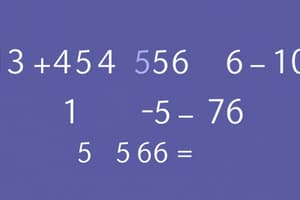Podcast
Questions and Answers
What is the relationship between rational numbers and real numbers?
What is the relationship between rational numbers and real numbers?
- Rational numbers are the same as real numbers
- Real numbers are a subset of rational numbers
- Rational numbers are a subset of real numbers (correct)
- Real numbers cannot include rational numbers
How do rational numbers differ from irrational numbers?
How do rational numbers differ from irrational numbers?
- Rational numbers can be expressed in fraction form (correct)
- Irrational numbers cannot be represented on a number line
- Irrational numbers can be expressed in fraction form
- Rational numbers are always integers
What property allows for the arrangement of rational numbers in a linear order?
What property allows for the arrangement of rational numbers in a linear order?
- Linear order property (correct)
- Countably infinite property
- Uncountable property
- Density property
In which fields are rational numbers essential due to their ability to measure quantities accurately?
In which fields are rational numbers essential due to their ability to measure quantities accurately?
What is the significance of rational numbers being countably infinite?
What is the significance of rational numbers being countably infinite?
Why is it impossible to list all real numbers in a sequence?
Why is it impossible to list all real numbers in a sequence?
Which of the following is a characteristic of rational numbers?
Which of the following is a characteristic of rational numbers?
What is an example of a rational number in decimal form?
What is an example of a rational number in decimal form?
If given the fraction rac{5}{9}, what is its equivalent decimal representation?
If given the fraction rac{5}{9}, what is its equivalent decimal representation?
Which property do rational numbers exhibit that makes them useful in mathematical operations?
Which property do rational numbers exhibit that makes them useful in mathematical operations?
What type of number can always be expressed as a rational number by setting the denominator as 1?
What type of number can always be expressed as a rational number by setting the denominator as 1?
A rational number must be expressed in the form rac{a}{b} where _____?
A rational number must be expressed in the form rac{a}{b} where _____?
Flashcards are hidden until you start studying
Study Notes
Exploring Number Systems: Rational Numbers and Their Role
Number systems lie at the foundation of mathematics, enabling us to quantify, analyze, and solve problems in our daily lives. Among the various types of numbers, rational numbers hold a special place, as they provide a comprehensive framework for expressing and working with fractions and decimals.
Definition and Examples
A rational number is any number that can be expressed as the quotient of two integers, where the denominator is non-zero. This can be represented in the form of a fraction, such as [\frac{a}{b}], where (a) and (b) are integers and (b \neq 0). Examples of rational numbers include:
- Integer numbers: All whole numbers ((1, 2, 3,\ldots)) can be expressed as rational numbers by setting the denominator as (1). For instance, (3 = \frac{3}{1}).
- Fractions: Any fraction, such as [\frac{1}{2}, \frac{5}{3}, \frac{7}{10}], is a rational number.
- Decimals: Fractions can be represented in decimal form, such as (0.625, 1.4,) and (3.14159). These decimals can also be expressed as rational numbers, for instance, (0.625 = \frac{625}{1000}).
Properties and Applications
Rational numbers possess several key properties that make them useful in solving mathematical problems and formulating new concepts. Some of these properties include:
- Closed under addition and multiplication: The sum and product of any two rational numbers will always be a rational number.
- Linear order property: Rational numbers can be arranged in a linear order, known as the order of the real numbers.
- Density: Between any two rational numbers, there exist infinitely many other rational numbers.
Rational numbers find applications in various fields, including:
- Science and engineering: Rational numbers are essential in fields such as physics, chemistry, and engineering due to their ability to accurately measure and represent quantities, such as lengths, masses, and time intervals.
- Finance and economics: Rational numbers are used to represent prices, interest rates, and other financial quantities in economics and business.
- Geometry: Rational numbers are used to measure the length of geometric figures and to determine the location of points on a number line.
Relationship with Other Number Systems
Rational numbers are a subset of the greater number system known as the real numbers, which also includes irrational numbers (e.g., (\pi, \sqrt{2})). Rational numbers are the only numbers that can be expressed in the form of a fraction ( \frac{a}{b} ).
The set of rational numbers is countably infinite, meaning that there is a bijection between the set of rational numbers and the set of natural numbers. However, the set of real numbers is uncountable, making it impossible to list all real numbers in a sequence.
Conclusion
Rational numbers provide a powerful and versatile tool for representing and manipulating quantities in various contexts. They form the foundation of algebra, geometry, and calculus, and their properties help us understand more advanced mathematical concepts. As we continue to explore the world of numbers and their applications, the study of rational numbers will remain an important and valuable area of mathematical inquiry.
Studying That Suits You
Use AI to generate personalized quizzes and flashcards to suit your learning preferences.




